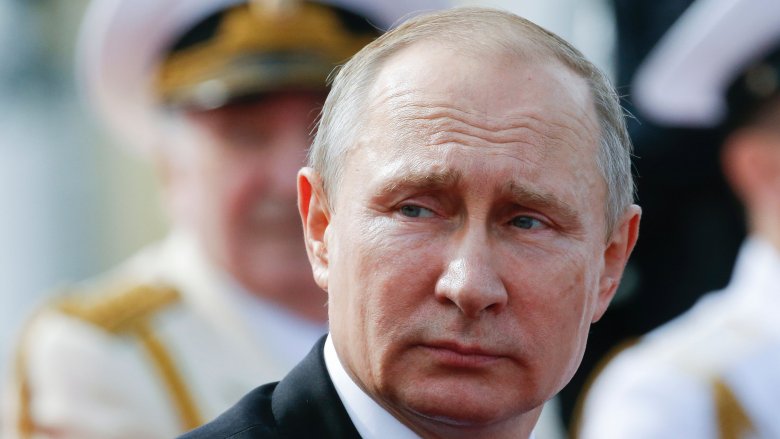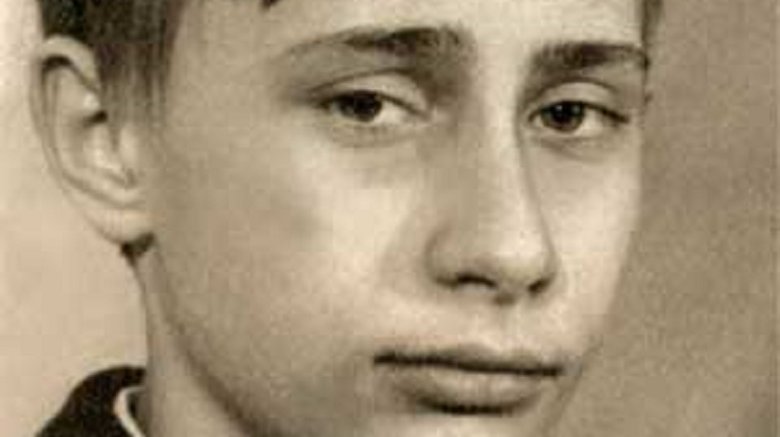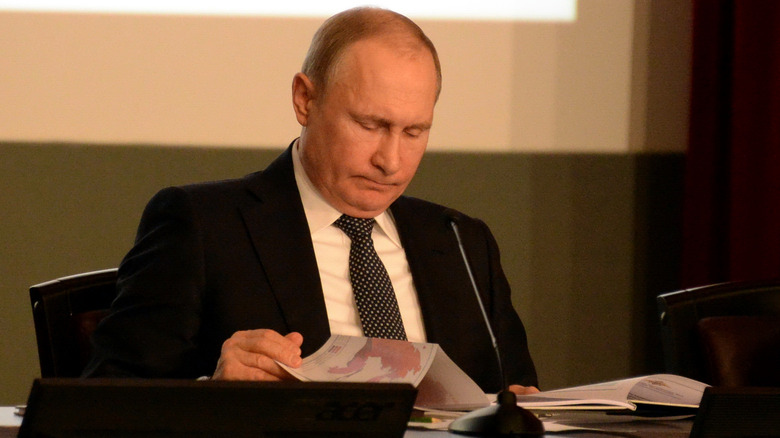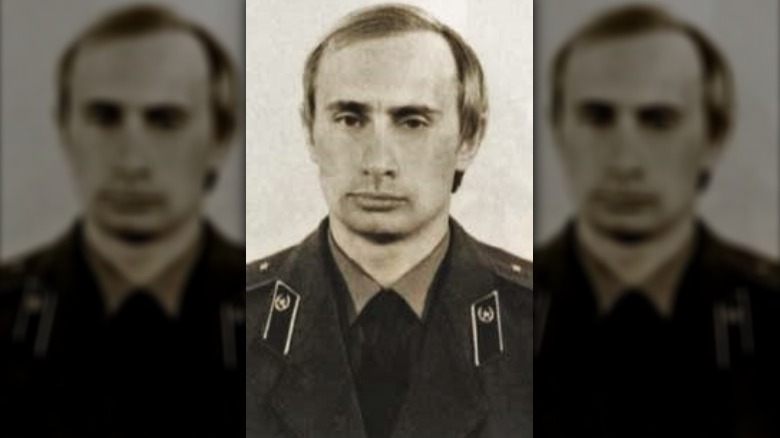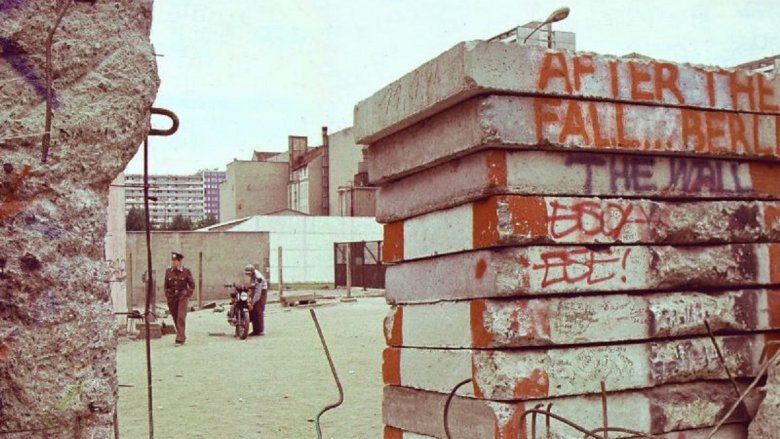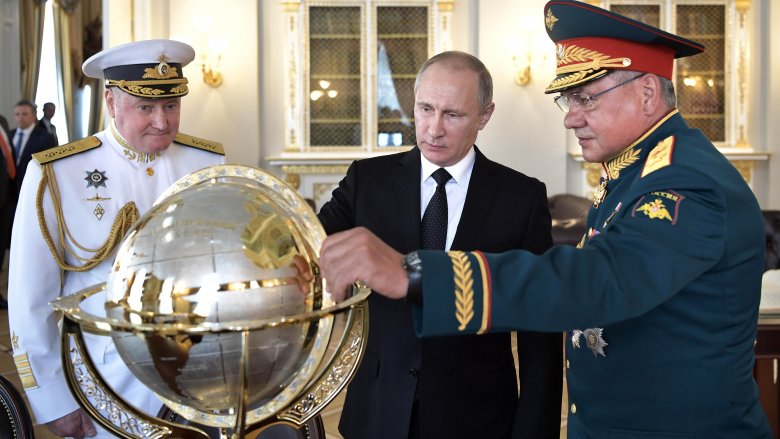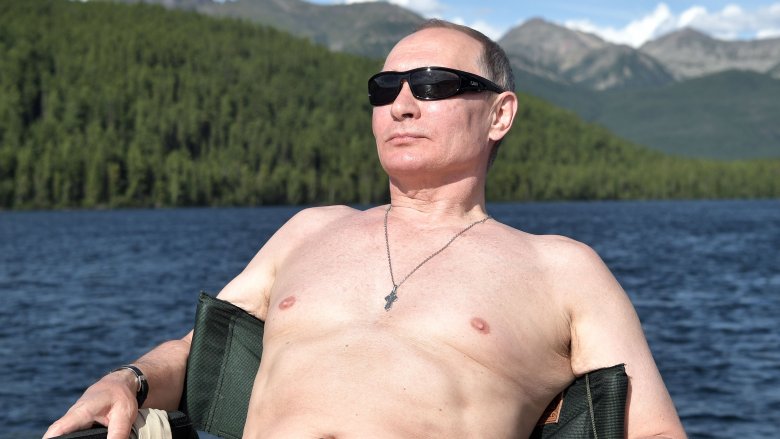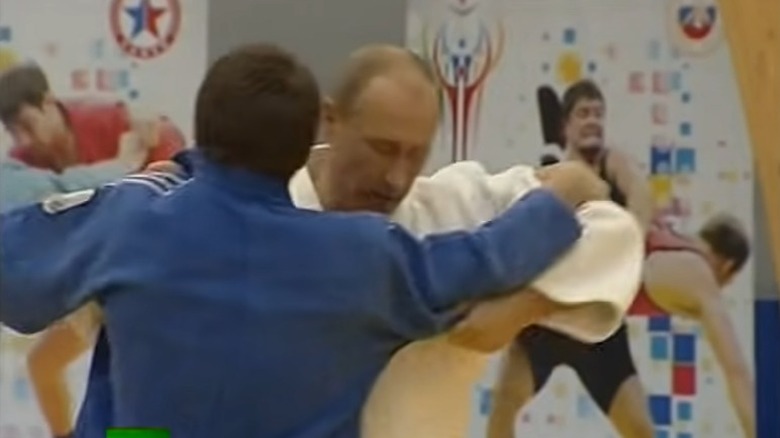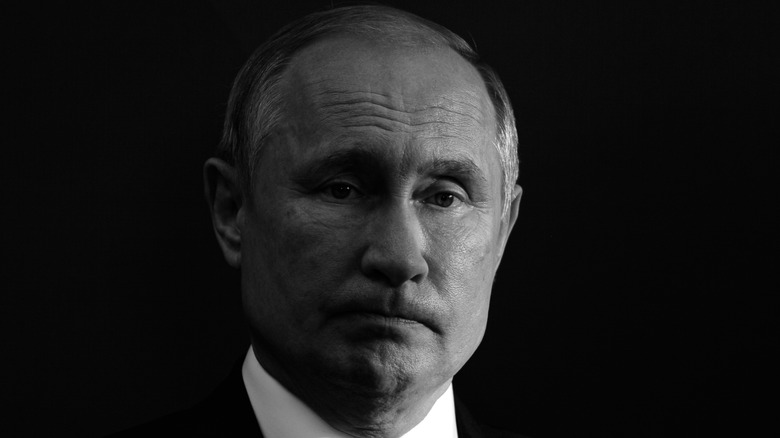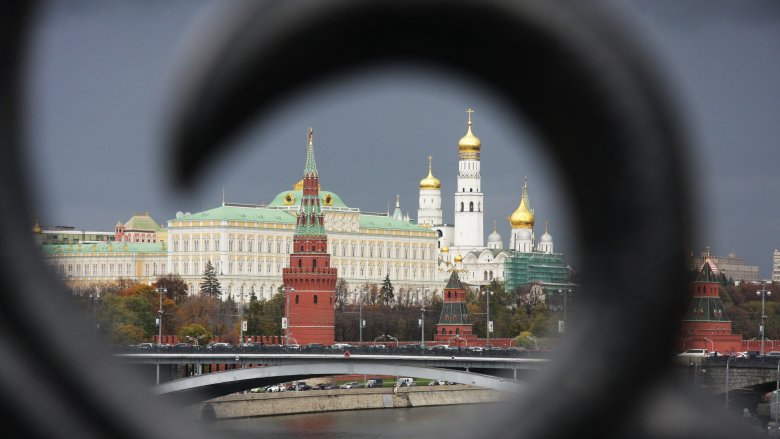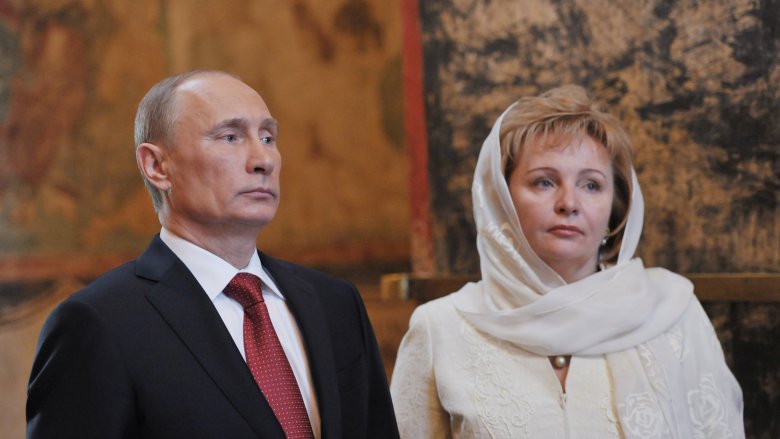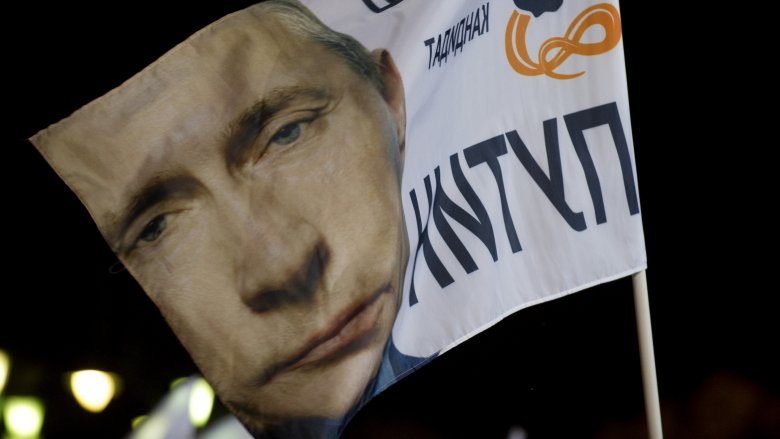How Vladimir Putin Went From Poor Kid To President
What's there to say about Vladimir Putin that hasn't been said? To critics, he's an election-tampering, gay rights-hampering, democracy-defying, shirtless, horse-riding terror of a tyrant. To diehard supporters, he's a polar bear-hugging, judo-loving, manly mannered, wrongly slandered, shirtless Slavic savior. To the indifferent, he's just some guy who's into upper-body nudity. Feel free to take any or none of those positions. The aim here isn't to praise or pillory Putin but to provide some perspective on the man behind the many faces. Whether you think he's Superman or subhuman, he has a fascinating backstory.
The young rat-catcher
If baby Vladimir Putin's crib had been a rusty bear trap, it would seem perfectly in line with the rest of his harsh upbringing. In his book, "First Person," Putin revealed that his father was a physically disabled factory worker whose legs had been blown halfway to hell in a World War II suicide mission (via The New York Times). His mother –- who had lost a child to diphtheria and nearly starved to death during the war –- swept streets, cleaned lab equipment, and did other odd jobs for meager pay, according to The Los Angeles Times.
Putin's childhood home would have made a canned sardine feel cramped. He and his parents lived in a tiny room as part of a shared apartment. They had no bathtub or hot water, and their toilet sat next to a dangerously dilapidated stairwell that was riddled with holes. One of Putin's teachers described the family's kitchen as "a square, dark hallway without windows."
To pass the time, Putin and his pals harassed the rats that plagued his apartment's stairwell. It was during one of those rodent hunts that the future president learned a valuable lesson about the dangers of backing opponents into a corner: "Once I spotted a huge rat and pursued it down the hall until I drove it into a corner. It had nowhere to run. Suddenly it lashed around and threw itself at me. I was surprised and frightened. Now the rat was chasing me." Putin got away, but the memory never escaped him.
Vladimir Putin the pupil
Vladimir Putin's homes life was no picnic. But he more than compensated by devouring classroom time with disruptive outbursts. His official Kremlin biography depicts the early portion of his education as a period of chronic tardiness and infrequent studying. He seldom dressed properly and seemed to wear rebellion like a badge of honor. Citing the Russian tabloid, Komsomolskaya Pravda, ABC News reported that young Putin ignored lessons, chucked chalk erasers at fellow students, and fought his gym teacher on multiple occasions.
The unruly Putin's grades were middling for the most part. However, he excelled at history and German (both of which played major roles later in his life). German in particular had a stranglehold on Putin's heart. Adorkably, he kept German flashcards in his chemistry textbook. (Perhaps he used the periodic table to spell out "Berlin," which is totally doable.)
Every good teacher knows there's a big difference between performance and potential, which certainly proved true in Putin's case. Behind his veneer of impudence and eraser-based violence was the beating brain of a grade-A student. In sixth grade, a teacher helped him tap into his inner scholar and his marks improved significantly. Per The Los Angeles Times, Putin's high school years were a complete 180 from his puckish primary school days. After getting accepted to a school for the gifted, he established himself as an outstanding, no longer standoffish student. From there he went to law school and soon after joined the KGB.
The eager KG-Beaver
Most youngsters have vocational dreams that get whittled down by knife-edged reality. (Not everyone can be a professional cake enthusiast.) But Vladimir Putin pretty much brought his fantasy to fruition. As The Los Angeles Times revealed, he knew from ninth grade on that he wanted to join the KGB. Putin would later admit that his desire was "based on romantic stories about spies" rather than a concrete understanding of the organization itself.
Driven by his naïve boyhood yearning, he traveled to the KGB headquarters in Leningrad to offer his services. No dice. Officials told him to go to law school instead. He listened, earning a law degree in 1975. Evidently impressed with his follow-through, the intelligence agency offered Putin a post, which he gladly accepted. He soon went to spy school, where he honed his German skills and judo-chopped his way to a black belt.
In 1985, Putin traveled to East Germany to do intelligence work. The details of his exact activities are murky at best, but The Atlantic suggested he may have collected technological secrets or enlisted high-ranking government officials as part of a mission called Operation Luch (or "beam"). In 2017, Putin made what press reports called a "stunning revelation," claiming to have worked "with illegal intelligence." In other words, his activities somehow involved deep-cover espionage without the cover of diplomatic protections. That could mean Putin was a Soviet James Bond or a Russian Judi Dench at the very least.
When East Germany went south
East Germany provided a drastic departure from the brutal austerity of Soviet Russia. It had cleaner streets, good beer, and greater political freedom. As German biographer Boris Reitschuster told the BBC, Vladimir Putin "enjoyed very much this little paradise for him." He could now pursue far finer things than stairwell rats, including trendy clothes and a car. The spy life wasn't too glamorous, but it didn't need to be when he could just knock back a cold one with a comrade or flip through a fashion catalog.
However, there always comes a time when fantasies fade. Putin's rude awakening came in November 1989 with the fall of the Berlin Wall. Citizens had already been pouring into West Germany like blood from a hemorrhaging heart. But once freedom seemed assured, many began turning their attention and aggression toward the Soviet officials who had long stifled their freedom. Fearing violent upheaval, Putin desperately sought support from Moscow officials. But instead of getting the tanks he requested, Putin received a harrowing reply: "We cannot do anything without orders from Moscow. And Moscow is silent."
The words were deafening. Communism had been cornered, but instead of ferociously defending itself, it surrendered without a single squeak. The Atlantic succinctly summarized how this influenced the disillusioned spy: "Putin learned that his future activity, in the KGB or otherwise, could not be guided by blind loyalty to an ideology or to specific political leaders. His loyalty had to be to the state itself."
The post-Communist manifesto
After crashing to Earth from his Communist cloud, Vladimir Putin wanted to create a system grounded in nationalistic fervor and subservience to ruling institutions. During his first stint as Russian prime minister, he fleshed out that vision in a 1999 document titled "Russia at the Turn of the Millennium." Commonly referred to as "The Millennium Manifesto," the document presented Putin's reading of Russia's past and future prospects.
As The Atlantic summarized, the prime minister primarily attributed Russia's history of political upheaval to a divided populace. Denizens had grown overly enamored with foreign concepts like free speech and individuality. For Russia to take its place in the pantheon of great nations, citizens needed to unite under a muscular central government. Like a Slavic James Polk, Putin framed this not in terms of desire but destiny. Rather fittingly (and perhaps intentionally), two days after unveiling his manifesto on Russian destiny, Putin became president.
News Corp Australia contributor Charles Firth has argued that a 1997 military manifesto called "Foundations of Geopolitics" directly informed Putin's plans for achieving international dominance. The brainchild of political scientist Aleksandr Dugin and General Nikolai Klokotov, it advocated for heavy reliance on cunning and stealth manipulation. The text also called for infiltrating Western institutions, usurping Ukrainian land, promoting a Brexit, and even helping Germany and France become prominent Western European powers. International affairs buffs and literally anyone with internet access may have noticed that arguably all of these aims have indirectly or very directly been accomplished.
The millennium president
Ten years separated the fall of the Berlin Wall and Vladimir Putin's ascent to the Russian presidency. During much of that intervening period, Putin was a relative unknown. And once he became known, he aroused little confidence among political experts. According to The Atlantic, even when Boris Yeltsin promoted Putin to prime minister in 1999, analysts largely agreed that the upstart would "be greatly limited in what he is able to do." Perhaps those prescient pundits might have also predicted the speedy demise of Google, which was founded just 16 months before Putin first became president. Putin's reign is almost Google years old.
In fairness to the pundits, Putin's track record up to that point was fairly barren. Per the History Channel, after serving briefly as deputy mayor of Leningrad, Putin worked under President Boris Yeltsin between 1998 and 1999. He started as a liaison between the Kremlin and lower government offices, became head of security for a while, and soon got tapped to be prime minister. Five months later, Yeltsin stepped down and named Putin president.
In less than two years, Putin had gone from being a political question mark to a giant red exclamation point. However, as The Washington Post reported, the young president won public approval by waging an aggressive war against Chechen rebels and touting himself as a tough guy. When the time came to officially elect a new Russian president, Putin won decisively.
The judo master and judocrat
RT hilariously refers to Vladimir Putin as a "Judo Knight" and features him swiveling his hips and tossing docile opponents about like dolls. Everyone knows that there ain't no party like a Putin judo party. What's less obvious is that the Putin judo party don't stop. Judo is so essential to Putin's identity that he politically aligns himself with billionaire judo enthusiasts. Some have even referred to his inner circle as a "judocracy."
Newsweek noted that Putin views judo as a philosophy that "teaches self-control, the ability to feel the moment, to see the opponent's strengths and weaknesses, to strive for the best results." That ethos has come to define his political decision-making and approach to geopolitical conflict. According to Russian deputy finance minister Sergei Aleksashenko, Russia's 2014 Crimea takeover perfectly illustrates the president's judo state of mind.
As Newsweek detailed, rather than engaging in a bloody battle, Putin curried favor with ethnic Russians in the Ukrainian military, largely eliminating the need for fighting. Viewed in light of Aleksashenko's assessment, it seems fair to say that the judo knight turned his opponent's main line of defense into a defect. In a similar vein, political wonk Nikolai Petrov has argued that Putin uses economic sanctions on Russian businessmen to "consolidate power, to build a fence, which is what he wants." It seems that in a world where geopolitics often gets likened to chess, Putin trips up adversaries by playing a different game altogether.
Knowledge as power
In many ways, Vladimir Putin is a historical hybrid, a Soviet era holdover adapted to modern times. That becomes abundantly clear when one examines the way he wields information as both a shield and a weapon. As Wired explained, unfettered information gives Putin the willies on account of his KGB training. For years, knowledge was what you stole or withheld from others, not something you nakedly shared with the world like a degenerate brain nudist.
Moreover, the collapse of the Soviet Union coincided with increased internet access and intellectual independence. In Putin's mind, it was a sign that society had veered off course and needed correcting. As president he resolved to return Russia to a kind of pre-knowledge state, an artificial Eden where the Tree of Knowledge bore pre-approved plastic apples. Initially Putin limited his focus to controlling television and newspapers, unaware of the internet's true transformative potential. Then, 2011 happened.
That year, oppressed Arab citizens lashed out against their governments in response to damning documents released by Wikileaks. Social media sites like Facebook and Twitter helped fuel the uprisings. Tunisia's government toppled. In Russia, accusations of electoral chicanery spurred voter unrest. But unlike Moscow in 1989, Putin refused to stay silent. It was time to drop the hammer and also the sickle if need be. In 2012, the Kremlin began quashing unwanted websites and sent internet trolls after bloggers and journalists who criticized the regime. Naturally, hacking became a technological trump card.
The impenetrable president
Despite ruling Russia for the better part of 20 years, Vladimir Putin has remained unreadable as ever to presidents and pundits alike. It's almost as if a former Soviet spy with a law degree and a strong dislike of political transparency has been running the show all this time. And what a show it's been. New York Times contributor and longtime Russia correspondent Steven Myers spent years observing the workings of the Kremlin and offered a few insights on what makes Putin so impenetrable.
Unsurprisingly, Putin keeps the media on a tight leash and himself on an even tighter one. During interviews, he answers controversial questions with cautiously worded equivocations, always sure not to paint himself into a corner. Aside from heavily scripted press conferences and choreographed public engagements, most of what he does goes unreported. Meanwhile, the slightest hint of criticism from any public figure — politician, professor, or otherwise — gets swiftly snuffed out.
Putin also puts up a technological wall, though not necessarily in the way that you think. In a 2014 Time article, Simon Shuster argued that the ex-spy's aversion to using modern technology has made him incredibly difficult to tap. He doesn't use a cell phone. He owns a computer but avoids using the internet. He got his news delivered directly by intelligence officials via folders and paper documents. Putin is essentially a terrifying version of your Luddite grandpa.
Vladimir Putin's very private life
A man as guarded as Vladimir Putin is catnip for journalists. The media tries to unravel him like a ball of yarn, only to discover that said ball is superglued together. Even so, that hasn't stopped reporters from tearing off a few fibers of information, sometimes to their detriment. It's known, for example, that Putin had a 30-year marriage to former air hostess Lyudmila Putina. As MSN pointed out, despite the couple's lengthy union –- which ended in 2013 –- no official family portrait has ever been released and Putina (who later changed her surname to Ocheretnaya), has been largely invisible to the press.
Putin also has two equally inaccessible daughters, 30-year-old Yekaterina and 31-year-old Mariya. Their lives have been kept more or less under wraps. For the longest time, reporters barely knew what they looked like, let alone what they did for a living. However, in recent years, the opaque veil of secrecy has been partially lifted to reveal that Yekaterina is an academic at Moscow State University, where she pumps out papers on mathematics and mechanics. It's also believed that she and her husband own billions of dollars in petrochemical stocks, so good for them. Mariya is apparently married and ... that's basically all the press knows about her.
One media report salaciously alleged that Putin fathered additional children out of wedlock with Olympic gymnast Alina Kabaeva. However, the outlet making that claim quickly went bye-bye. Understandably, other news purveyors have steered clear of the topic.
According to The Week, Putin allegedly had an affair with Svetlana Krivonogikh while he was married, as per an investigation by Russian media platform Proekt in 2020. It was also alleged that he had another illegitimate child with this mistress. No surprise he denied such claims and worked to keep the story out of the media.
With great power comes even greater power
Vladimir Putin's life has spanned an absurd number of historic events. He was born five months before Joseph Stalin's death. He witnessed Communism's collapse firsthand and inherited his first presidency from the Soviet Union's last leader. He literally reshaped another country by taking one of its territories. Putin has outlasted two U.S. presidents, and many people believe he helped get a third elected through high-tech skullduggery. Presumably, he did at least most of these things while bare-chestedly practicing judo on horseback.
Given his seemingly forever-long and jarringly half-naked reign, many have wondered when will Putin put his shirt back on and retire from politics? In 2014, Russian reporters asked the president point-blank whether he intended to change the constitution to make his reign permanent. According to CBS, Putin described that scenario as "not good and detrimental for the country," further adding, "I do not need it as well."
The Independent noted that Russia's constitution prohibits presidents from having more than two consecutive terms. Putin became a three-term president by simply taking a break in between to become prime minister a second time. However, in 2021, he signed a law that would allow him to potentially serve until 2036, The Guardian reported. The new legislation essentially "zeroes out" his previous terms.
Currently, nobody knows his intentions because, as Putin put it, he hasn't "decided yet if [he] will leave the presidency." After all, the truly powerful don't have to cling to their power; they simply have it.
